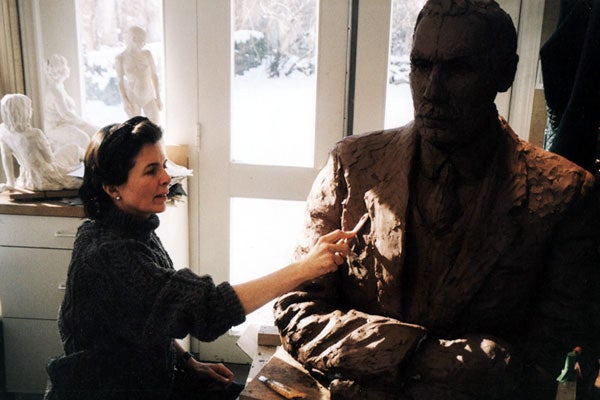
Art, science and history on a monumental scale
Published: July 25, 2013
For University of Toronto alumna Adrienne Alison, each of her sculptures begins with the skeleton.
With a clinical eye, she carefully considers the bone structure of the person she is creating through her art. Then, she thinks about musculature and ligaments. Finally, she thinks about the slow uncoiling of collagen that occurs with time, causing skin to droop and sag.
“The starting point for me is the anatomy of a subject,” says Alison.
A graduate of the Faculty of Medicine’s biomedical communications program, Alison is a sought-after sculptor. Recently she was chosen by the National Capital Commission to create a monument to the War of 1812. Prominently located on Parliament Hill across from the National War Memorial, Alison’s work will mark the 200th anniversary of the War of 1812 and will recognize the courage and bravery of those who successfully defended their land in the fight for Canada.
This commission allows Alison to engage three of her great passions: art, science and history.
Her interest in art and science started with her family; Alison's grandmother and an aunt were doctors, her mother was an architect and her father was an engineer. But her parents were also talented and enthusiastic amateur artists. After her first art class as a child, Alison knew that sculpting would be her lifelong pursuit.
She completed an undergraduate degree in art history at Queen’s University, and refined her technique through an art-training program at Central Technical School in Toronto before applying to U of T, her parents’ alma mater. She was one of only five students admitted to the biomedical communications program.
“The first year included dissecting a cadaver alongside a medical student, which was fascinating,” Alison says. “It allowed me to really understand the mechanics of the human body, which helps me when I’m positioning my figures.”
Before dedicating herself to sculpting full-time, Alison established the Head and Neck Prosthetic Clinic at Sunnybrook Health Sciences Centre for 10 years. Much of her work was building prosthetics for patients who had lost facial features due to cancer.
“It was very rewarding work that required a very careful attention to detail,” she explains.
She also worked with the Canadian Standards Association to advance the safety of children’s hockey helmets and created displays for the Ontario Science Centre.
As a sculptor, Alison enjoys private commissions but her most notable work has been public statues, including a bust of fellow Canadian artist C. W. Jefferys, newspaper magnate James Beaty, and Bishop John Strachan, who helped found U of T and Trinity College. In addition to the War of 1812 monument, Alison is working on a statue commemorating one of the great heroes of that war, Sir Isaac Brock.
Her focus on history is no accident. She has a deep interest in Canadian history and sees her art as a chance to share her enthusiasm for history with the public.
 “We have a tendency to downplay our history in Canada, but think about Vimy Ridge,” Alison says, referring to the great battle in the First World War. “It was a nation-building moment. That’s also true of the War of 1812.”
“We have a tendency to downplay our history in Canada, but think about Vimy Ridge,” Alison says, referring to the great battle in the First World War. “It was a nation-building moment. That’s also true of the War of 1812.”
Just as the Vimy monument in France has become a national symbol, appearing on the new Canadian $20-bill, she hopes the same will be true of the War of 1812 monument (pictured in model form above).
The monument will be unveiled in autumn 2014.
Liam Mitchell is a writer in the Faculty of Medicine at the University of Toronto.



